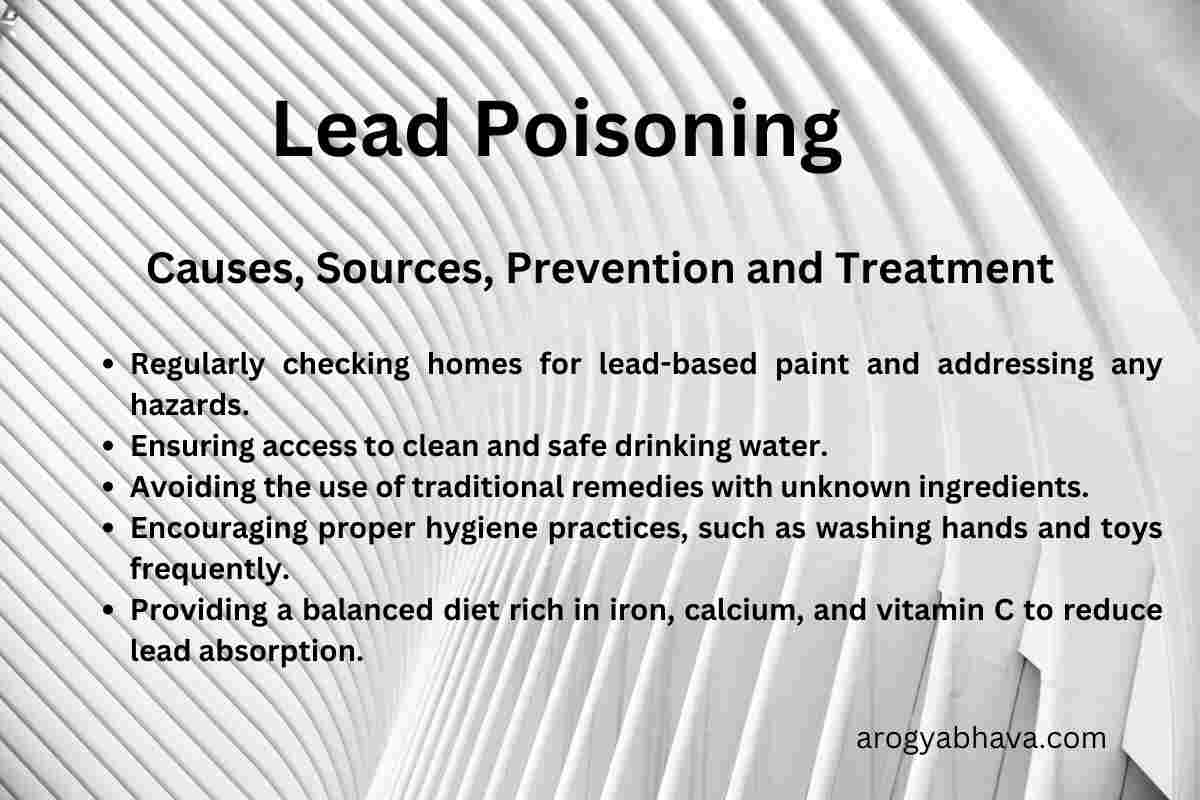Lead Poisoning – Symptoms, Causes and Prevention

Lead poisoning is a serious health condition caused by the accumulation of lead in the body. Lead is a toxic heavy metal that, when ingested or inhaled, can have harmful effects on various organs and systems, particularly the nervous system and brain. Lead poisoning is especially dangerous for young children, pregnant women, and individuals with prolonged exposure to lead-containing materials.
What Is Lead Poisoning?
Lead is a meal that is considered a very poisonous metal. Sometimes it shows serious, and sometimes,s it shows fetal conditions. Lead poisoning occurs in our bodies. Lead is also found in paints, toys, art supplies, dust particles, gasoline products, etc., and can cause various health and mental issues, mainly affecting young people. In small children, lead transfers to their bodies when they lick the principal object in their mouth. This act as poison for them. It is a treatable disease but can affect various organs of the body.
Causes and Sources of Lead Exposure
Lead poisoning typically occurs through exposure to lead-containing substances in various environments. Common sources of lead exposure include:
Lead-Based Paint
Homes and buildings built before 1978 may have lead-based paint, which can deteriorate over time and create lead dust or chips that can be ingested or inhaled.
Soil Contamination
Soil can become contaminated with lead from past use of leaded gasoline, lead-based paint, or industrial activities.
Drinking Water
Lead can leach into drinking water from lead pipes, plumbing fixtures, or solder, especially in older homes.
Imported Goods
Certain imported products, such as toys, cosmetics, ceramics, and spices, may contain lead-based materials.
Occupational Exposure
Individuals working in industries like construction, painting, plumbing, and battery manufacturing may be at risk of lead exposure.
Traditional Remedies
Some traditional remedies, cosmetics, and home remedies may contain lead-based ingredients.
Effects of Lead Poisoning
Lead poisoning can have serious and lasting health effects, especially in children. It can lead to:
Cognitive Impairment
Lead exposure can affect brain development, leading to learning disabilities, decreased IQ, and behavioural problems.
Nervous System Damage
Lead can damage the nervous system, causing seizures, developmental delays, and behavioral issues.
Anaemia
Lead interferes with the production of haemoglobin, leading to anaemia and fatigue.
Digestive and Kidney Issues
Lead can affect the gastrointestinal system and kidneys, leading to abdominal pain, constipation, and kidney damage.
Reproductive and Developmental Effects
Lead exposure during pregnancy can harm the developing fetus and lead to preterm birth, low birth weight, and developmental issues.
Prevention and Treatment
Preventing lead poisoning involves identifying and mitigating potential sources of lead exposure. This includes:
- Regularly checking homes for lead-based paint and addressing any hazards.
- Ensuring access to clean and safe drinking water.
- Avoiding the use of traditional remedies with unknown ingredients.
- Encouraging proper hygiene practices, such as washing hands and toys frequently.
- Providing a balanced diet rich in iron, calcium, and vitamin C to reduce lead absorption.
How To Reduce The Risk Of Having Lead Poisoning
- It is a treatable disease. You teach your children about leadership, why it harms the body, and how you can prevent it.
- As a parent, you must provide healthy food to your children which is full of iron, calcium, and vitamin C.
- If you are living in a house which is built before 1978 so, paint it two times a year.
- Before renting your house, ask your landlords about peeling and flaking paints.
- Wash your legs before you enter the house.
- Clean your floor with a mop and cloth regularly.
If lead poisoning is suspected, a medical professional should be consulted. Treatment may involve reducing further exposure, implementing a healthy diet, and, in severe cases, medical interventions to remove lead from the body.
FAQs
Q. What are the symptoms of lead poisoning?
Ans. Symptoms Of Lead Poisoning are:
- Abdominal pain and cramps
- Aggression
- Constipation
- Excess sleep
- Headache
- Fatigue
- Irritation
- Loss of development skills in children
- Loss of appetite
- The problem of high blood pressure
- Body become numb
- Anaemia
- Kidney problem
- Low IQ level
- Loss of growth development in children
- Vomiting
- Muscles become week
- Slow walking
- Seizures
- Coma
- Confusion
Q. What are the causes of lead poisoning?
Ans. Causes Of Lead Poisoning are:
- House paint contains a high amount of lead
- Toys and household objects made by mixing low amounts of lead
- Bullet, fishing sinkers, curtain weight
- Pipes and sink faucets
- Soil pollution
- Jewellery, pottery, and lead figure
- Storage batteries
- Kajal and eyeliner cosmetics
Also Read: International Lead Poisoning Prevention Week